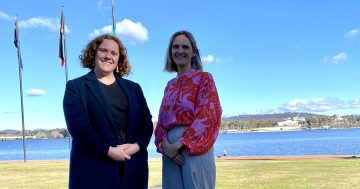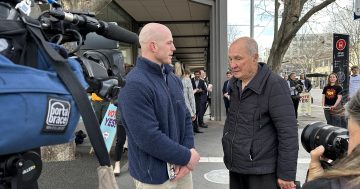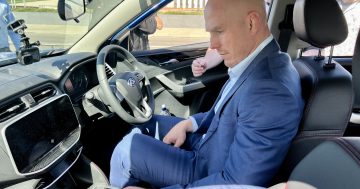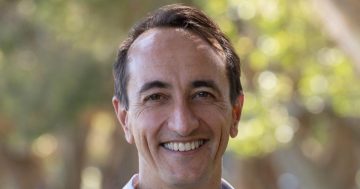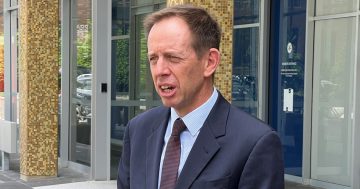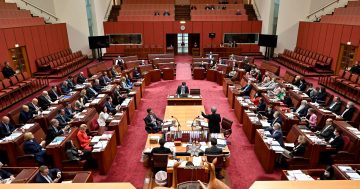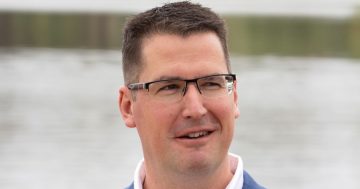
The Greens are currently poised to steal the ACT Senate seat out from under the feet of the Liberals Zed Seselja. Zed has been virtually absent from his electorate for the past three years, yet has flown in and under taken one of the most expensive campaigns for a Senate seat in recent history. All while moving from his home in Tuggeranong to the inner north, and moving his campaign office from the south as well. He has abandoned his core constituents along with his claim to be a “Tuggeranite’, and they have not failed to take notice. Recently Zed has made his campaign directly about opposition to light rail in Canberra, angering some Liberal supporters who believe in light rail in the ACT, even going so far as to conduct push-polling against the idea.
Zed faces an uphill battle as a result to achieve his quota outright from primary votes once again, if he fails to do so like at the 2013 election, then this time around it is almost inevitable that 1st preferences will then deliver the seat to the Greens Christina Hobbs instead. Last federal election, Zed failed to achieve a quota outright, and the Greens came within 8,417 votes of taking the seat off of Zed, which was actually a swing against the Greens at the time of 3.7%. With the swing against the Liberals and major parties in general this time, and a large swing towards the Greens, it is very likely the ACT will be considered a swing seat for the Senate post election, as Labor and the Greens take the two seats on offer.
I sat down with Christina to discuss the major issues of this campaign and find out why people should vote for her instead of for Zed Seselja or Kate Gallagher.
In regards to the Senate voting changes, Senators receiving less than 1% of the primary vote shouldn’t be entitled to be a sitting Senator relying on entirely on preferences from the major parties. However, not all Greens supporters necessarily agreed with the position taken, and some don’t have as much confidence in voting for the Greens at this election as a result of that. What would you say to long term supporters struggling with the position the party took on this, especially in working with the Liberals to pass it?
One of the four key pillars of the Greens is democracy. This was a policy that Bob Brown introduced and that we’ve been fighting for, for eons, its a policy that our membership has continually supported, every time a policy review has been done its been supported. you’ll never find a party where you agree with every policy. We’ve made a change that we think is going to create a more fairer and credible voting system and I think once people actually go the ballot and they’re empowered to select their own preferences and they’ll see that’s a fair system, but I think this wont be an issue after the election.
Can you understand the perception that this is somehow an attack on minor parties or the ability for minor parties to be able to be represented in our democratic system.
If you look at who was benefiting from that, if you look at who is in parliament today that wouldn’t be there if that was a different system, there are some minor parties but the vast majority are actually Liberal candidates, so to say this will unfairly affect minor parties, yes it will have effect on some of those, but its also going to have effect on anyone who’s been gaming the system, such as some Liberal and Labor candidates have done. I think at the end of the day this is a policy that says if your a strong independent or micro party, if you have good policies, if you go out there and do the vote, you still have a great chance of getting into the Senate, but what it does say is your not going to get there by luck alone.
What will the Greens do to obtain federal funding for light rail expansion in the ACT?
The Greens have just announced a $400 million dollar funding commitment for light rail expansion in the ACT. We hope south Canberra residents will benefit from the planned funding. Zed Seselja had no long-term vision for Canberra. The Greens will push strongly for renewable energy funding for Canberra’s transport industry regardless of who is in government, especially from Malcolm Turnbull, who has expressed support for light rail in Canberra. The funding would come from the Greens’ Australian Infrastructure Bank proposal, by investing money on behalf of institutional investors.
Asylum seekers are a major issue this election, especially with the PNG court ruling that the detention centre must be shut down. Neither Labor nor Liberal have proposed any real alternative as to where they will be housed at the moment, including the Liberals rejecting New Zealand’s offer to take some of them. The major parties are in lockstep on this issue, and neither are willing are to take an actual bold policy step and pursue real solutions on this, what do you see as the path forward from here? Obviously a lot of Australians want to keep the boats stopped regardless of their feelings on refugee settlement, so how do we treat refugees fairly while at the same time avoiding allowing people smugglers to put people in so much danger and encourage them to keep coming here by boat?
The Greens have a really solid policy on asylum seekers, I have spent a large portion of my career working with the United Nations in conflict refugee situations. The policy is two fold, first is to create regional processing centres so that people have an avenue to Australia that doesn’t require them coming by boat, so that they can get processed to come. The first reason why that is good is it reduces the need for people to get on boats, the second part and the untold story of this, is that we have greatly angered our neighbours through our current policy.
Our current policy is as much an international relations, a neighbour relations failing, as it is an asylum seeker failing. If we were to establish regional centres and do this is as showing leadership with these regional countries, then I believe we could also expect those countries to do more to control their own borders and stop people leaving in the first place. The most pressing concern that needs to be urgently address is getting people who have suffered unimaginable trauma back into Australia, and that is going to require a political shift, and that shift is only going to happen when enough progressive voters, any voter who cares enough about this issue, is willing to shift their vote on it.
The perception at the moment is that a lot of refugees are not genuine refugees but “economic refugees” as they are termed, do you think that is accurate?
Firstly the most important thing is that its not illegal to seek asylum, and its a fundamental principle of the global humanitarian principles we’re signed up to that you can seek asylum in any country, the country in which you arrive. So this idea of illegal arrivals, queue jumpers, that is just nonsense. Australia spends so much money locking people up, but our actual money we invest and our processes around determining asylum, are not world leading. We need to look at what is the issue, are we concerned about economic refugees, are we concerned about security, let’s look at that seriously and let’s look at how we can address that.
How we would address that is much better processes for actually determining who is and who isn’t an asylum seeker, somebody seeking refuge from persecution. What we do know however is that there’s hundreds of asylum seekers that have been deemed legitimate refugees that are still in Manus and Nauru. The fact is that you look at a country like Denmark, they spend $13,000 on average from the time an asylum seeker enters the country to when they are settled and integrated into society, working, employed, or in education. You look at Australia, we’re spending a million dollars per refugee to keep them locked in a hell hole, it’s a completely nonsensical policy to me.
There is a scare campaign at the moment, of Muslim men coming to Australia who want to rape women, treat them indecently, etc.,.. what would you say to that kind of scaremongering?
It is just scaremongering for political purposes, if you look at the data, its very clear that refugees, people who have come to Australia as a refugee, are on average less likely to commit any crime, and far less likely to commit a serious crime, so that argument just doesn’t stack up.
Should ASIO be playing a greater role in the assessments, or processing them quicker, is their current role appropriate?
I don’t think that ASIO is the right agency, if you look at how this is done in other parts of the world, it’s people working for the U.N. High Commission for Refugees, its not a skill set that requires high tech spying technologies or that sort of thing. There’s very clear ways of doing this kind of processing, and it’s about having the information of local areas where people claim to be from and validating that, by asking them “ok you are standing at this tree, how do you get to the shops? How do you get from the shops to your uncle’s house” for example. Getting people to go through these processes and then having linkages to people who live in those claimed areas. The ways of actually rigorously testing if people are legitimate asylum seekers are actually remarkably simple, and not costly.
If you look at something like fleeing persecution, are they claiming that they’re a member of an activist organisation, then you can check if they were, you can ask people if they were, it is a lot easier to check these claims than you think. It does require investment and robust processing facilities though, and if the concern is security, then it’s ok the public has those concerns, we shouldn’t try to dismiss them, we have to address them. But our message has to be there are very robust mechanisms of determining if someone is who they say they are, that they are from where they say they are, that they’ve fled persecution for the reasons that they’ve given. That’s where we should be investing our security money not locking people up in offshore detention.
The NBN has turned out to be an issue of high importance to voters this election, what do you want to say to voters who will be taking this issue into account when choosing how to vote?
This is a massive infrastructure investment project, that was supposed to transform regional society, was supposed to be the heart of transforming our economy towards a knowledge-based economy. What has happened to our NBN is just tragic, it’s been gutted, it’s been rolled out in inefficient ways, now we’re staring to see reports of inefficient technologies being used where they’re going to actually be of a high cost or a higher cost. I think it’s very telling this was being managed by Malcolm Turnbull at the time, and I think that’s very concerning.
We need to look at where it’s at now, I agree with Bill Shorten’s position that we cant undo what’s already been done, we have to be practical about what’s already been done. The Greens would like to take stock, and go back to the original plan to get as much fibre rolled out to homes and communities as possible, that doesn’t mean ripping out what’s already been done, but I don’t support the proposal from Bill Shorten as a whole. They’re bringing in a lot more non-fibre to the home, the Greens position is that we need to go back to the original visions of as much fibre as possible.
What would you say to Scott Morrison’s statement that he is able to understand the bigotry that LGBTQI people experience on a regular basis, because of his own hurtful experiences.
What absolute nonsense, I think that just goes to show the absolute lack of understanding that he has to be honest. It also goes to show that such a senior member of the Liberal party could say something so ignorant, it also goes to show the lack of understanding in the entire Liberal Party from a leadership level all the way down, how ridiculous.
The fake tradie who turned out to be a real tradie. What do you think of the Liberal Party’s ad?
I love fake tradie, how devastating he was a real tradie. Despite that, I think the premise of the public seeing an ad which was very clearly with all the talking points in there, is why people are turning from this election. The ad was farcical, people want to be treated with a little more intelligence and that’s why there was such a strong reaction to that. It was that part of the campaign where people are so frustrated after weeks of being talked to like children, that was sort of this very comical relief moment for people.
This perception that the Liberal Party likes to push out that they’re the party of small business, they’re the party of the tradies, they’re the party of people involved in development. You look at the Greens, I’m from a small business background, we have a number of small business people running in this election, tradies running as candidates, the part of the ad that really annoyed people is this kind of perception that all that tradies care about is their capacity to earn money through building investment properties, that is ridiculous.
Does the double dissolution work out to the Greens’ advantage in the Senate, will the Greens hold the balance of power in the Senate after the election, and what will the Greens do if there is a hung parliament?
It’s not clear that it will advantage us, some seats are going to be easier to win, and some are going to be harder. In states where we have one person elected it’s going to make it easier to get that person back in. For example in Queensland Larissa Waters is a certainty, we have a long shot opportunity of getting a second candidate in, but if we look at South Australia, because of this very decision our second Senate spot is in real trouble. Overall we expect that the results are going to be fairly evened out. When the Senate review committee looked at the voting reforms, what it showed was the Greens, Liberal and Labor would hold roughly the same ratios afterwards.
The House of Representatives is extremely exciting at the moment, there’s a number of places for the Greens to take seats, Nick Xenophon’s party has a real chance to take seats. What this really shows is that we’ve heard so much from this Liberal government about the chaotic years of the Labor/Green government, the chaos that’s been created by the micro parties, but at the end day it proves that people really value the contribution of the diversity in the Senate, and they’ll be voting for more of it in the House of Representatives.
Labor and Liberal are preferencing the Greens last around the country this election, long term will this come back to bite them?
This is clearly the major parties ganging up together to keep third players out, what both major parties fear potentially even more than losing the election is the emergence of a strong third party player, whether it’s the Greens or someone else.
What do you think of the rise of Nick Xenophon’s party and the rise of the Sex Party?
It shows people are increasingly disappointed with the two major parties and are looking for alternative voices, but I don’t particularly welcome the rise of their party, because overall they’re a conservative party, he [Xenophon] doesn’t support issues like gay rights and marriage equality, he doesn’t support strong action on climate change, ultimately more often than not he’s voted in line with the liberals. Nick Xenophon doesn’t particularly excite me. I support all minor parties essentially, having a diverse church of people out there talking about issues can only be a good thing, I wish the Sex Party the best of luck in the issues that they’re trying to push forward.
How likely are you to win a seat in this election? What would your focus be if you don’t win?
The Greens are absolutely campaigning to the end, we believe its absolutely winnable, it went down to three weeks of counting last time, the polling we’ve seen is favourable. We’ve seen Morgan polling come out that had the Greens for instance an extra 10% compared to the last election in the northern part of Canberra. We’re seeing the major parties spending more on advertising than we’ve ever seen, and more attacks on the Greens than ever ever seen before, all those things put together show that clearly both the major parties are scared about the Greens.
I also asked about the Greens policy on zero tolerance drug driving legislation in Australia. Christina said she would have to look into it further and get back to me, but unfortunately I had not received an answer on this by the time of publication. This will be covered in a future article instead.
Christina’s responses have been lightly edited for clarity, otherwise they are verbatim. Image source: supplied.












